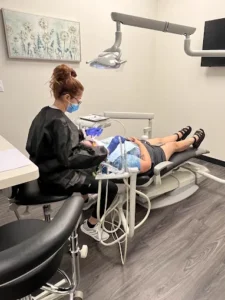Maintaining good oral hygiene is crucial throughout the year. It’s the key to keeping teeth healthy and smiles bright! When you have braces or Invisalign, it becomes even more important to keep your mouth clean. Brushing & flossing help keep your gums healthy and prevent harmful bacteria from growing during orthodontic treatment. It is important for anyone who has braces or aligners to maintain good oral hygiene since oral care with braces can be complicated and can cause a lot of issues to the teeth. Knowing these risks can help you maintain a healthy smile.
Many people don’t fully understand how important good oral health is for their overall health. Your mouth is the gateway to your body, so bacteria in your mouth can travel to other parts of your body & cause health problems. Before focusing on the types of dental care that are especially important for those with braces, it will be helpful to know why oral hygiene must be kept good at all times but all the more when one has braces.
Cleaning Every Part of Your Mouth During Treatment
Orthodontic treatment is a significant investment in your health and appearance, but it requires you to maintain good dental hygiene. Braces and clear aligners make dental care more challenging, which is why tools like interdental toothbrushes and floss threaders are necessary. If you neglect your oral hygiene, you could face several problems associated with braces poor oral hygiene.
Braces require you to brush your teeth morning, after breakfast, after lunch or any meal, and before you retire to bed. Another part is flossing and this also must be done daily or at least once a day. This extra effort is worth it because failing to brush and floss regularly can result in longer treatment times, damaged braces, bad breath, and even tooth decay. Poor dental hygiene with braces can significantly affect your treatment outcomes and overall dental health.
Preventing Bad Breath
One of the most unpleasant side effects of poor oral hygiene with braces is bad breath, also known as halitosis. When you eat, tiny pieces of food can get stuck around your braces, wires, and between your teeth. In case of negligence, bacteria and other substances that form plaque are produced, and they release unpleasant smells.
Stopping rotten breath includes using fluoride toothpaste and a fluoride rinse as well as flossing. Using a tongue scraper can also help remove bacteria from your tongue. Maintaining proper oral hygiene is crucial to keeping your breath fresh and your mouth healthy during orthodontic treatment.
Avoiding Tooth Decay and Gum Disease
Brushing your teeth with braces is more challenging because there are so many extra surfaces and tight spaces where food can get trapped. If you don’t brush your teeth and remove plaque, you could develop cavities, gingivitis, and periodontitis.
To reduce the risk of tooth decay and gum disease while wearing braces, stick to a diligent oral hygiene routine. After eating hard foods, soft drinks, or snacks, brush & rinse your mouth to protect your teeth and braces. Using a water flosser or interdental brush can help clean hard-to-reach areas around your braces.
According to a survey by the American Dental Association 2013, less than 31% of Americans floss daily, and nearly 19% don’t. That’s a lot of people with poor dental hygiene! Poor dental hygiene can have serious effects on your overall health.
Health Risks from Poor Dental Hygiene
Heart Disease and Stroke
People with gum disease are twice as likely to get heart disease and clogged arteries. This happens because plaque and bacteria from the gums can enter the body. These bacteria can block arteries, raising the chance of a severe heart attack. The blood vessels sending blood to the brain can also get clogged, increasing the risk of a stroke.
Dementia
Poor oral hygiene leading to tooth loss can affect memory and lead to dementia. Inflammatory substances from poor dental health can cause parts of the brain to die, which impacts memory.
Respiratory Conditions
Gum disease bacteria can enter the bloodstream and reach the lungs, affecting the respiratory system. This raises the risk of acute bronchitis or chronic pneumonia, as studies by the Journal of Periodontology show.
Diabetes
Research indicates that over 95% of people in the U.S. with diabetes also have gum disease or have lost teeth. Diabetes makes it easier to get infections and affects blood sugar control, linking it to dental health.
Cancer
Experts have found a connection between gum disease and cancer. Men with gum disease are almost 50% more likely to get kidney or pancreatic cancer and 30% more likely to get blood cancer. This highlights the importance of good dental hygiene.

Other Health Issues
Poor dental hygiene can also lead to other serious problems, including:
- Infertility problems
- Erectile dysfunction
- Premature birth
Speeding Up Your Orthodontic Treatment
Orthodontic treatment to align the teeth, or fix improper bites might require many months or several years. Good hygiene is essential to make your orthodontic treatment faster and simpler. When you don’t clean your teeth and braces properly, food particles feed bacteria, and plaque builds up. This can weaken the wires and brackets on your braces, making them less effective and prolonging your treatment. Braces that are worn without proper oral hygiene can cause the treatment period to be longer and consequently be more expensive.
Simple Tips for Taking Care of Your Smile
Here are some tips to keep your teeth in great shape:
- Change your toothbrush every two months to reduce bacteria.
- Eat firm foods like carrots, apples, and celery to help clean your teeth as you eat.
- Use baking soda and brush your teeth at least once per week, to give your teeth that white look.
- Brush your teeth at least twice a day with a soft-bristle toothbrush and fluoride toothpaste.
- It is advisable to be more cautious especially around the brackets and wires in that they are areas where plaque tends to develop.
- Brushing your teeth is also equally relevant to floss to get rid of all the food particles and plaque between the gaps of your teeth.
- Floss threaders or interdental brushes will help make this easier to accomplish.
One and a half years is enough to establish good oral hygiene to reduce the issues resulting from poor oral hygiene braces.
Build Healthy Oral Hygiene Habits for a Brighter Smile
Proper dental hygiene is very important when a patient is undergoing orthodontic treatment to achieve the best results and or to avert some adverse effects. Not only will it allow you to have an attractive smile, but at the same time, it will lay a strong foundation for a lifetime of good oral hygiene. However, it is pertinent to always remind patients that only braces do not make beautiful smiles, but proper oral hygiene from the time of receiving braces and even after the removal of braces is also essential.
Another important concept concerning orthodontic treatment is the maintenance of good oral hygiene. It is important to familiarize oneself with the common health consequences stemming from poor dental cleanliness to avoid the numerous maladies that accompany braces. Thus, by following the measures aimed at maintaining the cleanliness of your mouth you not only pave the way for a successful orthodontal treatment but also become a much healthier person.








